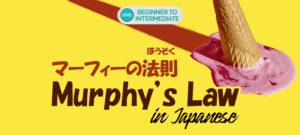
CLAY’S LAW: After learning a difficult Japanese grammar point, only after you forget it will an opportunity arise to use it.
| MURPHY’S LAW: |
1) “IF ANYTHING CAN GO WRONG IT WILL.”
失敗する可能性のあるものは、失敗する。
shippai suru kanōsei no aru mono wa, shippai suru.
If anything can go wrong, it will.
Lit. meaning: failing + possibility’s + some thing + fails “Something that has a chance to fail, fails.”
VOCAB :
- 失敗する shippai suru – to fail, to make a mistake, to blunder
- 可能性 kanousei – potentiality, likelihood, possibility
- の no – ‘s (possessive)
- あるもの aru mono – thing that exists, something
2) O’TOOLE’S COMMENTARY ON MURPHY’S LAW: “MURPHY WAS AN OPTIMIST.”
マーフィーは楽観主義者だった。
Romaji : ma-fi- wa rakkan shugisha datta.
Murphy was an optimist.
Lit. meaning : As for Murphy, optim-ism person was.
VOCAB :
- マーフイー ma–fi– – Murphy
- は wa – topic particle (marks the topic of the sentence)
- 楽観 rakkan – optimism
- 主義 shugi – “-ism”, principle, doctrine
- 者 sha – a person who does something. (医者 issha – doctor; 学者 gakusha – scholar; 芸者 geisha – geisha…)
- だった datta – was (past simple)
3) ILES’ LAW: “THERE IS ALWAYS AN EASIER WAY TO DO IT.”
もっと簡単な方法がかならずある。
motto kantan na houhou ga kanarazu aru.
Without fail, there exists an easier way.
Lit. meaning : more + easy + way + without fail + exists
VOCAB:
- もっと motto – more
- 簡単 ( な ) kantan ( na ) – easy, simple (“na” is used when placed before nouns)
- 方法 houhou – method; manner; way; means; technique
- が ga – (usually marks the subject)
- かならず kanarazu – without fail; certainly
- ある aru – to be; to have; exists
This lesson page is based on an article found in Makoto e-zine #1. If you like this lesson, become a Makoto+ member today to give your Japanese a boost.





